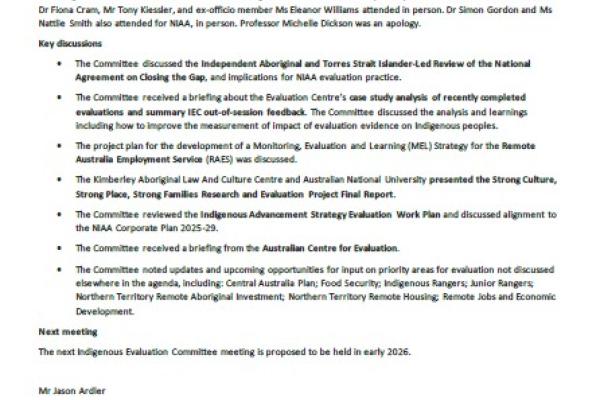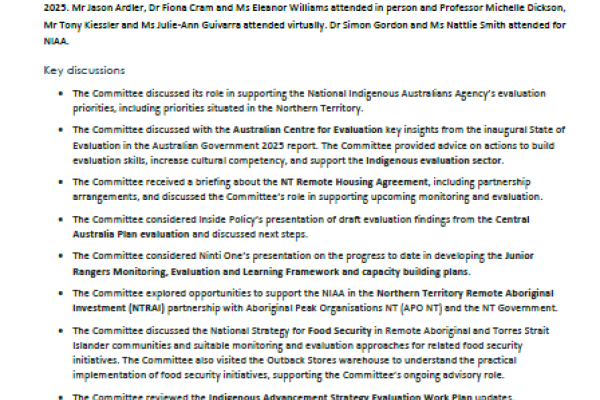Overview
The work of the National Indigenous Australians Agency (NIAA) is supported by data, evaluation and research.
The NIAA provides advice and information to the Minister for Indigenous Australians, the Australian Government, state and territory governments, organisations, providers and communities to inform evidence-based decisions that support the positive impact of policies and programs. The Agency is committed to empowering First Nations communities through sharing data, evaluations and research.
Find out more about key data, evaluation and research activities of the NIAA:
Framework for Governance of Indigenous Data
The Framework for Governance of Indigenous Data (the Framework) recognises the importance of data for self-determination. The Framework aims to provide Aboriginal and Torres Strait Islander people greater agency over how their data are governed within the Australian Public Service (APS) so that government held data better reflects their priorities and aspirations.
More detail about the Framework and practical guidance on how to build strong governance over Indigenous data holdings can be found on the Framework for the Governance of Indigenous Data website.
Aboriginal and Torres Strait Islander Health Performance Framework
Beginning in 2006, the Aboriginal and Torres Strait Islander Health Performance Framework (HPF) monitors progress on a range of outcomes drawn from over 60 data collections and consisting of 68 measures across three domains (Tiers):
- Tier 1 - Health status and outcomes
- Tier 2 - Determinants of health (such as employment, education, justice and safety)
- Tier 3 - Health system performance
The HPF is a comprehensive source of evidence designed to inform policy, planning, program development and research. The HPF is funded by the NIAA and is produced with the Australian Institute of Health and Welfare (AIHW).
The extensive HPF website is available here.
Evaluation
Evaluation helps us to gain an understanding of what works and what doesn't, for whom and why. Evaluation supports evidence-informed policy development, public accountability, learning and performance reporting.
The NIAA promotes and supports a culture that focusses on evaluation and performance improvement that centres First Nation people’s perspectives, priorities and knowledges. NIAA’s evaluations are guided by the Indigenous Advancement Strategy (IAS) Evaluation Framework.
For further information on evaluation across the Commonwealth, see the Australian Centre for Evaluation.
Indigenous Advancement Strategy (IAS) Evaluation Framework
The IAS Evaluation Framework guides the conduct and development of a stronger approach to evaluation of programs and activities under the Indigenous Advancement Strategy. The Framework structures our efforts to:
- Generate high quality evidence that is used to inform decision making
- Strengthen Indigenous leadership in evaluation
- Build capability by fostering a collaborative culture of evaluative thinking and continuous learning
- Emphasise collaboration and ethical ways of doing high quality evaluation at the forefront of evaluation practice in order to inform decision making
- Promote dialogue and deliberation to further develop the maturity of evaluation over time
Also see the Productivity Commission Indigenous Evaluation Strategy.
IAS Evaluation Work Plan
NIAA provides details on evaluation, research and data improvement activities that are planned, underway or completed on the IAS Evaluation Work Plan. The Work Plan supports the commitment to transparency made in the Evaluation Framework. The Work Plan is regularly updated, with at least one update per quarter.
IAS Evaluation Clearinghouse
Final reports of evaluations and related projects are published on the IAS Evaluation Clearinghouse to support transparency, enable easier searching and encourage greater use of evaluation findings.
Indigenous Evaluation Committee
This independent external committee provides strategic and technical advice to the NIAA and supports the improvement of evaluation practices in line with the IAS Evaluation Framework’s principles of relevance, credibility, robustness and appropriateness.
For more information about members and meeting communique see: Indigenous Evaluation Committee | NIAA
Research
NIAA supports First Nations-led research, capability development and data improvement projects for First Nations communities and organisations. This work recognises the importance of First Nations led research and the role of research in generating evidence for policy and program design and implementation.
Research Partnerships
NIAA is a partner organisation in the Centre of Excellence for Indigenous Futures which involves participation in the Community Partner Advisory Board and the Research Board. The Indigenous Futures Centre conducts Indigenous-led, community-based research on health and wellbeing, law and justice, and education and economies. Find out more here.
Examples of further research projects are listed as part of the IAS Evaluation Work Plan.
Closing the Gap Community Data Projects
Priority Reform Four of the National Agreement on Closing the Gap commits to providing shared access to location-specific data and information to Aboriginal and Torres Strait Islander communities and organisations to support informed decision-making.
The key partnership action under Priority Reform Four is to establish new community data projects in up to six locations across. Partners to the National Agreement through Joint Council agreed the following locations:
- Blacktown LGA in Western Sydney (NSW)
- The Kimberley Region (WA)
- The Western Suburbs of Adelaide (SA)
- Maningrida (NT)
- Doomadgee (QLD)
- Gippsland (VIC)
Each Community Data Project will include the following key features.
- Governments providing Aboriginal and Torres Strait Islander organisations and communities access to disaggregated regional data and information on Closing the Gap, subject to meeting privacy requirements.
- Establishing partnerships between Aboriginal and Torres Strait Islander people and government agencies to improve collection, access, management, and use of data, including identifying improvements to existing data collection and management.
- Governments making data more transparent by informing Aboriginal and Torres Strait Islander people what data they have and how it can be accessed.
- Building capacity of Aboriginal and Torres Strait Islander organisations and communities to collect and use data.



